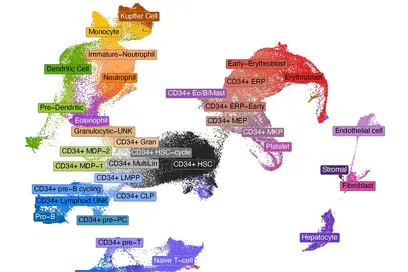Die radiologische Bildgebung ist ein zentrales Element für die Diagnostik und Therapie von Krebserkrankungen. Ging es früher allein darum, Metastasen aufzuspüren und präzise zu erfassen, wie der Tumor sich ausdehnt, so steht heute vermehrt die funktionelle und biologische Charakterisierung von Tumoren im Zentrum der radiologischen Forschung. Dazu erfassen Ärzte Blutversorgung, Stoffwechsel, Sauerstoffgehalt oder Bewegungen eines Tumors, um die Therapie optimal zu planen und den individuellen Therapieverlauf zu dokumentieren. Bei der Tumornachsorge soll zudem möglichst frühzeitig entdeckt werden, ob der Krebs erneut wächst.
Professor Dr. Heinz-Peter Schlemmer leitet seit Anfang dieses Jahres die Abteilung Radiologie des Deutschen Krebsforschungszentrums. Der Arzt und Physiker war zuletzt in der Abteilung Diagnostische Radiologie des Universitätsklinikums Tübingen tätig und als Leitender Oberarzt für den Bereich Magnetresonanztomographie verantwortlich. „Das DKFZ ist Deutschlands führende Einrichtung in der Krebsforschung. Daher ist es unsere Aufgabe, den Patienten fortlaufend verbesserte radiologische Verfahren anzubieten und die neuen Techniken möglichst schnell in präklinischen und klinischen Studien zu bewerten. Das DKFZ bietet uns ein ideales Umfeld, um die komplexe Bildgebungstechnologie weiterzuentwickeln“, erklärt Schlemmer die Ziele seiner Abteilung.
Bei seiner Arbeit im Deutschen Krebsforschungszentrum setzt Heinz-Peter Schlemmer unter anderem zwei Schwerpunkte: Für den ausgewiesenen Spezialisten für Magnetresonanztomographie (MRT) ist unter anderem die Diagnostik von Prostatakrebs durch dieses strahlungsfreie Verfahren eine große Herausforderung. Prostatakrebs ist der variabelste aller Tumoren und das Ziel des Radiologen ist es, per MRT Hinweise auf die Aggressivität des individuellen Tumors zu entdecken. Halten die Ärzte eine Therapie für zunächst nicht zwingend, so schlagen sie dem Patienten möglicherweise vor, den Krebs „aktiv zu beobachten“. Die MRT könnte bei der Verlaufsbeurteilung entscheidende Informationen über die Entwicklung der Bösartigkeit liefern und helfen, gezielt Gewebeproben aus verdächtigen Arealen in der Vorsteherdrüse zu entnehmen. „Wir wollen langfristig erreichen, dass die Patienten zum richtigen Zeitpunkt die richtige Therapie erhalten,“ beschreibt der Radiologe eines der Ziele seiner Arbeit im Deutschen Krebsforschungszentrum.
Für die Krebsdiagnostik ist die Computertomographie ein unverzichtbares Instrument. Das DKFZ hat kürzlich einen hochmodernen Computertomographen installiert, der in Deutschland bisher erst wenige Male verfügbar ist. Das System erlaubt eine so schnelle Bildgebung, dass sogar bewegliche Strukturen wie die Lunge oder das schlagende Herz in Bruchteilen einer Sekunde scharf darzustellen sind. Gleichzeitig kommt das CT bei jeder Untersuchung mit einem Bruchteil der bisher üblichen Strahlendosis aus. „Das kommt insbesondere den Patienten zugute, die wir mehrfach untersuchen müssen, um etwa den Erfolg einer Chemotherapie mitzuverfolgen“ erklärt Schlemmer. Anhaltspunkte hierfür erhalten die Forscher z.B. von Änderungen des Blutflusses innerhalb des Tumors im Verlaufe der Therapie, die mit dem neuen Gerät dreidimensional dargestellt werden können.
Heinz-Peter Schlemmer wurde 1961 im österreichischen Linz geboren. Er studierte Physik und Medizin an der Universität Heidelberg, wo er auch im Fach Medizin promovierte. Seine Ausbildung zum Facharzt für Diagnostische Radiologie absolvierte er am Deutschen Krebsforschungszentrum, am Universitätsklinikum Heidelberg sowie am Städtischen Klinikum Mannheim. Als Visiting Professor forschte er im Bereich der Magnetresonanz an der Yale University in den USA, dem Prince of Wales Hospital der Chinese University of Hong Kong, dem Hamad Medical Center in Doha, Katar, sowie in einem Entwicklungslabor der Firma Siemens im Geschäftsbereich Molekulare Bildgebung in Knoxville, USA. Er ist Mitglied mehrere nationaler und internationaler wissenschaftlicher Gesellschaften. Heinz-Peter Schlemmer ist Vater von vier Kindern.
Ein Bild von Heinz-Peter Schlemmer steht im Internet zur Verfügung unter:
www.dkfz.de/de/presse/pressemitteilungen/2010/images/schlemmer.jpg
(Fotografin: Jutta Jung)
Über das DKFZ
Das Deutsche Krebsforschungszentrum (DKFZ) ist mit mehr als 3.000 Mitarbeiterinnen und Mitarbeitern die größte biomedizinische Forschungseinrichtung in Deutschland. Wissenschaftlerinnen und Wissenschaftler erforschen im DKFZ, wie Krebs entsteht, erfassen Krebsrisikofaktoren und suchen nach neuen Strategien, die verhindern, dass Menschen an Krebs erkranken. Sie entwickeln neue Methoden, mit denen Tumoren präziser diagnostiziert und Krebspatienten erfolgreicher behandelt werden können. Beim Krebsinformationsdienst (KID) des DKFZ erhalten Betroffene, Interessierte und Fachkreise individuelle Antworten auf alle Fragen zum Thema Krebs.
Um vielversprechende Ansätze aus der Krebsforschung in die Klinik zu übertragen und so die Chancen von Patientinnen und Patienten zu verbessern, betreibt das DKFZ gemeinsam mit exzellenten Universitätskliniken und Forschungseinrichtungen in ganz Deutschland Translationszentren:
- Nationales Centrum für Tumorerkrankungen (NCT, 6 Standorte)
- Deutsches Konsortium für Translationale Krebsforschung (DKTK, 8 Standorte)
- Hopp-Kindertumorzentrum (KiTZ) Heidelberg
- Helmholtz-Institut für translationale Onkologie (HI-TRON) Mainz – ein Helmholtz-Institut des DKFZ
- DKFZ-Hector Krebsinstitut an der Universitätsmedizin Mannheim
- Nationales Krebspräventionszentrum (gemeinsam mit der Deutschen Krebshilfe)
Das DKFZ wird zu 90 Prozent vom Bundesministerium für Forschung, Technologie und Raumfahrt und zu 10 Prozent vom Land Baden-Württemberg finanziert und ist Mitglied in der Helmholtz-Gemeinschaft Deutscher Forschungszentren.



